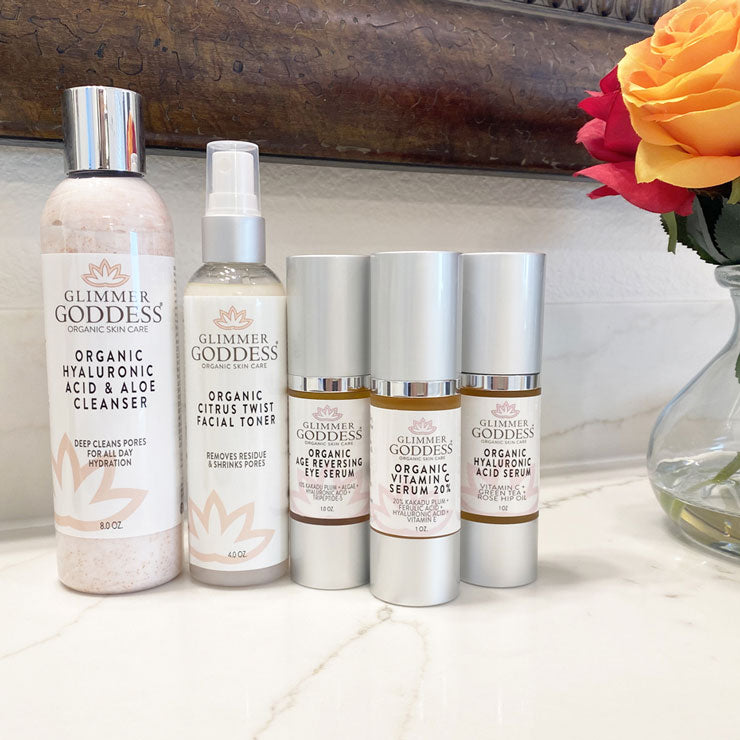
Winter Skincare for Eczema to Soothe Sensitive Skin🌟
Discover how to combat eczema during winter with expert skincare tips. Learn about the environmental factors, best products, and lifestyle habits to keep your skin hydrated and healthy.
Conquering Eczema in the Chill of Winter
What are the environmental factors that worsen eczema in winter?
As the temperature drops and the air becomes drier, individuals with eczema often find their skin condition exacerbating during the winter months. Understanding the environmental factors that contribute to this seasonal flare-up is the first step in managing the condition effectively.
The perfect storm of winter weather
- The cold, dry air typical of winter can strip the skin of its natural oils, leading to increased dryness and irritation.
- Harsh winds and biting cold can further compromise the skin's protective barrier, making it more susceptible to inflammation and itchiness.
- The lower humidity levels during the winter months also contribute to the lack of skin hydration, leaving the skin vulnerable to eczema outbreaks.
How does cold weather affect skin hydration?
Maintaining proper skin hydration is crucial for individuals with eczema, and the winter climate can pose a significant challenge in this regard.
The drying effects of cold air
- The cold, dry air of winter draws moisture out of the skin, leading to a loss of essential lipids and natural oils.
- This dehydration can cause the skin to become tight, flaky, and more prone to cracking, all of which can trigger eczema flare-ups.
- Without adequate moisture, the skin's protective barrier is weakened, making it more susceptible to irritants and allergens that can exacerbate eczema symptoms.
What role does indoor heating play in eczema flare-ups?
While the cold outdoor environment can wreak havoc on eczema-prone skin, the use of indoor heating can also contribute to the problem, often in unexpected ways.
The double-edged sword of indoor heating
- Many heating systems, such as forced-air furnaces, can further dry out the air, leading to a decrease in humidity levels.
- This dry indoor air can strip the skin of its natural moisture, causing it to become increasingly dry and irritated.
- Additionally, the use of space heaters or other localized heating sources can create hot spots on the skin, leading to increased inflammation and discomfort for those with eczema.
Navigating the challenges of winter weather and its impact on eczema requires a multifaceted approach. By understanding the specific environmental factors that exacerbate the condition, individuals can take proactive steps to protect their skin and maintain optimal hydration, ultimately finding relief from the discomfort of eczema even in the depths of winter.
Winter Skincare: Keeping Your Skin Hydrated and Healthy
What Creams and Moisturizers are Best for Winter Dryness?
During the winter months, the dry, cold air can wreak havoc on our skin, leaving it feeling tight, flaky, and uncomfortable. To combat this seasonal dryness, it's essential to choose the right skincare products that will effectively hydrate and nourish our complexions.
Selecting the Ideal Moisturizer for Winter
- Look for creams and lotions that contain rich, emollient ingredients like shea butter, ceramides, and hyaluronic acid, which can effectively lock in moisture and strengthen the skin's barrier.
- Opt for thicker, more occlusive formulas, as they tend to be more nourishing and long-lasting during the dry winter weather.
- Avoid products with harsh, drying ingredients like alcohol, fragrance, and certain preservatives, as they can further strip the skin of its natural oils.
- Consider incorporating a facial oil into your routine, either on its own or mixed with your regular moisturizer, for an extra boost of hydration.
By choosing the right moisturizing products for your skin type and concerns, you can keep your complexion soft, supple, and healthy all winter long.
How Can Bathing Routines Help Manage Eczema?
For those struggling with eczema, the winter months can be particularly challenging, as the dry air and harsh temperatures can exacerbate the skin condition, leading to intense itching, redness, and irritation. Fortunately, there are some simple steps you can take in your bathing routine to help alleviate these symptoms and keep your eczema under control.
Incorporating Soothing Baths into Your Regimen
- Use lukewarm water instead of hot water, as the latter can strip the skin of its natural oils and worsen dryness.
- Add colloidal oatmeal, baking soda, or gentle, fragrance-free bath oils to your bathwater to help calm inflammation and soothe the skin.
- Avoid harsh, drying soaps and opt for a gentle, moisturizing cleanser instead.
- Immediately after bathing, apply a thick, creamy moisturizer to damp skin to lock in hydration.
Supplementing with Targeted Treatments
- Incorporate a fragrance-free, eczema-specific cream or ointment into your daily routine to target the specific symptoms of your condition.
- Look for products containing ingredients like ceramides, colloidal oatmeal, or hydrocortisone, which can help repair the skin's barrier and reduce inflammation.
- Consult with a dermatologist if your eczema persists or worsens, as they can provide personalized recommendations and, if necessary, stronger prescription treatments.
By making a few simple adjustments to your bathing habits and incorporating targeted eczema treatments, you can effectively manage your skin condition and find relief from the discomfort of winter eczema.
What Ingredients Should We Look for in Winter Skincare Products?
As the cold, dry air of winter sets in, our skin often requires a more intensive, nourishing skincare routine to stay healthy and hydrated. When selecting your winter products, it's important to look for specific ingredients that will provide the necessary moisture and protection your complexion needs.
Essential Ingredients for Winter Skincare
- Hyaluronic acid: This humectant can attract and retain vast amounts of water, keeping the skin deeply hydrated.
- Ceramides: These lipids help reinforce the skin's protective barrier, preventing water loss and shielding against environmental aggressors.
- Glycerin: A powerful emollient, glycerin helps draw moisture into the skin and seal it in.
- Shea butter: A rich, creamy butter that delivers intense nourishment and soothing properties to dry, irritated skin.
- Vitamin E: An antioxidant that can help protect the skin from free radical damage and provide an extra layer of hydration.
Avoiding Potential Irritants
- Steer clear of products containing alcohol, fragrance, and harsh preservatives, as these can further strip the skin of its natural oils and exacerbate dryness.
- Look for fragrance-free, hypoallergenic formulas, especially if you have sensitive skin or conditions like eczema.
- Consider incorporating soothing, anti-inflammatory ingredients like colloidal oatmeal or chamomile to calm redness and irritation.
By carefully selecting winter skincare products that contain these nourishing, hydrating, and protective ingredients, you can help ensure your skin stays healthy, comfortable, and radiant all season long.
By addressing the unique needs of our skin during the winter months, we can effectively combat dryness, irritation, and other seasonal concerns. With the right moisturizers, bathing routines, and carefully curated ingredients, we can maintain a healthy, glowing complexion throughout the colder seasons.
Mastering Winter Eczema: A Comprehensive Guide
How does diet affect eczema flare-ups in winter?
Proper nutrition plays a crucial role in managing eczema, especially during the colder months. The winter season can exacerbate eczema symptoms due to factors like dry air, harsh winds, and temperature fluctuations.
Certain foods can help soothe inflammation and alleviate eczema flare-ups, while others may trigger or worsen the condition. By understanding the relationship between diet and eczema, you can take proactive steps to manage your symptoms effectively.
- Incorporate anti-inflammatory foods like fatty fish (salmon, mackerel, sardines), nuts and seeds, leafy greens, and berries into your diet. These nutrient-dense options can help reduce inflammation and provide essential vitamins and minerals.
- Limit your intake of processed, high-sugar, and high-salt foods, as they can contribute to inflammation and worsen eczema symptoms.
- Avoid potential trigger foods, such as dairy, gluten, or citrus fruits, as they may exacerbate your eczema. It's essential to identify and eliminate any foods that seem to worsen your condition.
- Ensure you're getting adequate amounts of omega-3 fatty acids, which have been shown to have anti-inflammatory properties and can help manage eczema.
What lifestyle habits can help combat winter eczema?
In addition to a balanced diet, adopting certain lifestyle habits can significantly improve the management of eczema during the winter months.
Incorporating these practices into your daily routine can help alleviate your symptoms and provide long-term relief.
- Establish a consistent skincare regimen that includes gentle, fragrance-free moisturizers and emollients. This can help strengthen the skin's protective barrier and prevent moisture loss.
- Avoid long, hot showers or baths, as they can strip the skin of its natural oils and exacerbate dryness. Instead, opt for shorter, lukewarm bathing experiences.
- Incorporate stress-reducing activities, such as yoga, meditation, or deep breathing exercises, into your daily routine. Stress can trigger or worsen eczema flare-ups.
- Ensure you're getting adequate sleep, as lack of sleep can contribute to inflammation and make eczema symptoms more pronounced.
- Consider using a humidifier to add moisture to the air, especially in your living and sleeping spaces, to counteract the drying effects of winter.
Why is it essential to stay hydrated, even in colder weather?
Maintaining proper hydration is crucial for managing eczema, regardless of the season. During the winter, it's easy to overlook the importance of staying hydrated, as the colder temperatures may not always trigger the same thirst response as warm weather.
Adequate hydration plays a vital role in keeping the skin healthy and preventing eczema flare-ups. By prioritizing your fluid intake, you can support your skin's natural barrier and minimize the severity of your symptoms.
- Drinking enough water helps to replenish the skin's moisture levels, reducing dryness and itchiness associated with eczema.
- Proper hydration supports the skin's natural healing process, allowing it to better recover from eczema flare-ups.
- Staying hydrated can also help to regulate the immune system, which plays a key role in the development and management of eczema.
- In addition to plain water, you can incorporate hydrating foods like soups, stews, and fresh fruits and vegetables into your diet to boost your overall fluid intake.
By understanding the impact of diet, lifestyle habits, and hydration on eczema, you can develop a comprehensive approach to managing your winter eczema effectively. Embracing these strategies can help you find relief, minimize flare-ups, and maintain healthy, comfortable skin throughout the colder months.
Unleash Your Skin's Radiance: Discover Our Organic Skincare Solutions 🌟
Organic Eczema Lotion - Stop the Itch, Heal The Skin 🧴
Eczema, a chronic skin condition that can cause intense itching, irritation, and discomfort, is a daily struggle for many. But with our Organic Eczema Lotion, you can wave goodbye to the frustration and embrace soothed, rejuvenated skin.
Unlock the Power of Nature's Remedies
- Formulated with French Green Clay, this lotion helps to alleviate the persistent itching associated with eczema, providing immediate relief and allowing your skin to heal.
- Enriched with Tamanu Oil, a potent natural anti-inflammatory, this lotion works to reduce redness, swelling, and bacterial exposure, aiding the healing process.
- Packed with nourishing vitamins and antioxidants, our Organic Eczema Lotion deeply hydrates and nourishes the skin, restoring its natural barrier and preventing further flare-ups.
- Gentle, non-greasy, and suitable for all skin types, this lotion is a game-changer for those struggling with eczema, offering a safe and effective solution to reclaim your skin's health.
- Formulated with love and care, our Organic Eczema Lotion is free from harsh chemicals, parabens, and synthetic fragrances, ensuring a pure and natural experience for your delicate skin.

Shop Organic Eczema Lotion Now
Embrace your skin's natural radiance and say goodbye to the discomfort of eczema with our Organic Eczema Lotion. Experience the transformative power of nature's remedies and reclaim your confidence with soft, soothed, and healthy skin.
Organic Silky Dry Body Oil - 4 oz. 🛀
Indulge in the luxurious and nourishing experience of our Organic Silky Dry Body Oil. Formulated with the highest quality organic oils and extracts, this multipurpose beauty elixir is your ticket to radiant, glowing skin.
Unlock the Secrets of Skin Nourishment
- Enriched with a blend of rosemary, sunflower, and Vitamin E, this body oil delivers a powerful dose of antioxidants to protect your skin from environmental stressors and free radical damage.
- Infused with hydrating and nourishing oils, our Organic Silky Dry Body Oil deeply moisturizes and softens the skin, leaving it irresistibly smooth and supple.
- Suitable for all skin types, including those with eczema, this body oil is a versatile wonder, providing a radiant glow and a luxurious, spa-like experience.
- Crafted with care and free from harsh chemicals, parabens, and synthetic fragrances, our Organic Silky Dry Body Oil ensures a pure and natural experience for your skin.
- Designed to be easily absorbed, this non-greasy formula leaves no oily residue, allowing you to seamlessly transition from your pampering ritual to your daily activities.

Elevate Your Skin with Organic Silky Dry Body Oil
Experience the transformative power of our Organic Silky Dry Body Oil and unlock the secrets to radiant, nourished skin. Indulge in a luxurious, spa-like ritual and let your skin bask in the goodness of nature's finest ingredients.
Organic Whipped Body Butter 🧴
Bid farewell to dry, dull skin and embrace the luxurious, creamy goodness of our Organic Whipped Body Butter. This best-selling formula is the ultimate pampering companion for your daily skincare routine.
Unleash the Power of Organic Indulgence
- Handcrafted with a blend of organic and natural ingredients, our Organic Whipped Body Butter is a true skin-softening wonder, providing 24-hour hydration and gentle care for even the most sensitive, eczema-prone skin.
- Infused with a variety of delectable scents, ranging from soothing lavender to energizing citrus, this body butter offers a sensorial experience that will transport you to a state of pure bliss.
- Lightweight and non-greasy, our Organic Whipped Body Butter absorbs quickly, leaving your skin feeling silky smooth and nourished, without any heavy or sticky residue.
- Crafted in small batches to ensure the highest quality, this chemical-free formula is a must-have for your pampering routine, helping you achieve firm, healthy, and radiant skin.
- With over a dozen scent options to choose from, our Organic Whipped Body Butter allows you to customize your self-care experience, catering to your unique preferences and mood.

Indulge in the Luxurious Organic Whipped Body Butter
Elevate your daily skincare routine with the indulgent and nourishing Organic Whipped Body Butter. Unlock the secrets to silky, soft, and radiant skin with this best-selling, small-batch formula.
Q&A
How does cold weather affect skin hydration?
Cold weather can deplete the skin's natural oils, leading to dryness, tightness, and vulnerability to eczema flare-ups. Lower humidity levels in winter further contribute to skin dehydration.
What Creams and Moisturizers are Best for Winter Dryness?
Opt for creams with rich ingredients like shea butter, ceramides, and hyaluronic acid. Choose thicker, more occlusive formulas to lock in moisture and avoid products with harsh, drying ingredients.
How can Bathing Routines Help Manage Eczema?
Use lukewarm water, gentle cleansers, and moisturize immediately after. Consider adding soothing ingredients like oatmeal to your bath. Targeted eczema creams and ointments can also be beneficial.
What Ingredients Should We Look for in Winter Skincare Products?
Include hydrating ingredients like hyaluronic acid, ceramides, glycerin, shea butter, and vitamin E in your winter skincare products. Avoid irritants like alcohol and fragrance.
How does diet affect eczema flare-ups in winter?
Nutrient-rich, anti-inflammatory foods can help soothe inflammation and alleviate eczema symptoms. Avoid trigger foods like dairy or gluten, as they may worsen eczema.
By following these winter skincare tips and incorporating targeted treatments, you can effectively manage eczema flare-ups and maintain healthy, hydrated skin throughout the cold season.







